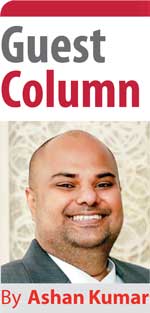Wednesday Feb 18, 2026
Wednesday Feb 18, 2026
Friday, 4 August 2023 00:12 - - {{hitsCtrl.values.hits}}

 The roles of communication professionals and public relations consultants are diverse, covering a wide range of responsibilities. Staying updated on market trends and current affairs is crucial, and continuous learning is essential for success. Reputation managers must be knowledgeable about global trends in social, political, environmental, economic, technological, and legal areas. Analytical and critical thinking skills are vital, along with understanding different media platforms and effective communication strategies. Content creation, storytelling, and networking are also valuable skills in this profession.
The roles of communication professionals and public relations consultants are diverse, covering a wide range of responsibilities. Staying updated on market trends and current affairs is crucial, and continuous learning is essential for success. Reputation managers must be knowledgeable about global trends in social, political, environmental, economic, technological, and legal areas. Analytical and critical thinking skills are vital, along with understanding different media platforms and effective communication strategies. Content creation, storytelling, and networking are also valuable skills in this profession.
In the interconnected world of PR, collaboration and establishing a professional body are vital for enhancing skills and creating learning opportunities. By fostering unity and knowledge sharing, PR professionals can drive industry standards and achieve unprecedented success in public relations.
The need for collaboration in PR
The local public relations industry will be celebrating 30 years, and the growth has been synonymous with the regional PR industry because of more corporate communication requirements requiring a more “Strategic Public Relations” approach.
Collaboration lies at the heart of effective PR practices. In an era of information overload and rapidly evolving stakeholder expectations, PR professionals must recognise the value of collective efforts. By collaborating with internal stakeholders, such as executives, employees, and subject matter experts, PR teams can gain valuable insights, align messaging, and create a cohesive narrative that resonates with the target “publics” (in the context of public relations “publics” refer to the different groups or audiences that an organisation or individual aims to communicate with, influence, or engage). Additionally, collaboration with external partners, such as professionals in the industry media outlets, influencers, and industry associations, can amplify brand messaging, build credibility, and effectively manage crises. By pooling resources, expertise, and perspectives, PR practitioners can navigate complex reputation challenges, mitigate risks, and build a positive perception for their organisations or their cause.
The benefits of a professional body
In this light a group of veterans and public relations specialists teamed up to create a nucleus public relations professional body.
Forming a professional body within the PR industry offers numerous advantages for PR professionals. Such organisations, whether industry associations or PR societies, provide platforms for knowledge sharing, best practice exchange, and continuous learning. Through conferences, seminars, and workshops, PR professionals gain opportunities to enhance their skills, stay updated on industry trends, and gain insights from industry experts. The collective knowledge and experience shared within these networks serve as invaluable resources for PR practitioners seeking to elevate their expertise and drive professional growth.
Professional bodies foster a sense of community and camaraderie among PR professionals. By connecting with peers in the industry, PR practitioners can build relationships, engage in mentorship programs, and find support in navigating the challenges of the profession. Collaborative initiatives, such as task forces, working groups, or committees, enable PR professionals to work together on industry-wide issues, standards, and ethics, strengthening the collective voice of the profession.
Importantly, a professional body plays a pivotal role in advocating for the PR industry’s interests and promoting its value to the broader business community. By uniting PR professionals under a shared vision and common goals, these organisations can shape industry standards, influence public perception, and advance the recognition of PR as a strategic function within organisations. This collective representation enhances the credibility and influence of PR professionals and contributes to the overall professionalisation of the field.
Collaboration for skill development and learning
While state universities produce over 100 graduates equipped with degrees in Mass Communication, Public Relations, and Media Management in Sri Lanka, there remains a need for a more cohesive effort to prepare these students for the realities of the communications market. It is widely acknowledged that practical collaboration between academia and the industry, particularly the corporate communications sector, is crucial for the development of the industry and its professionals.
Collaboration among PR professionals creates a conducive environment for skill development and learning. Through shared experiences, peer feedback, and mentorship programs facilitated by professional bodies, PR practitioners can continuously enhance their capabilities. Collaborative brainstorming sessions and knowledge-sharing initiatives allow for the exploration of innovative strategies, new thinking, and the discovery of strategies to adopt within the geography. The diversity of perspectives within a collaborative environment nurtures creativity, fosters learning, and promotes professional growth.
Professional bodies offer access to a wide range of educational resources, including workshops, webinars, and certification programs. These initiatives help PR professionals stay abreast of emerging trends, technological advancements, and evolving best practices in the field. By investing in their professional development and leveraging the collective expertise within a professional body, PR practitioners can expand their skill set, increase their marketability, and deliver exceptional results for their organisations or clients.
Pursuing qualifications and learning from reputable institutions like the Chartered Institute of Public Relations (CIPR) and the School of Communication and Reputation (SCoRe), The Public Relations and Communications Association (PRCA), or even Public Relations Consultants Association of India (PRCAI) equips professionals with essential knowledge and skills. Joining a professional body would give more access to structured educational and training programs like the above, covering various aspects of PR, from strategic planning and media relations to crisis communication and ethics.
Building capacity and networking globally
Collaboration and the establishment of a professional body contribute to building capacity within the PR community. By sharing knowledge, experiences, and resources, PR professionals collectively strengthen their capabilities and drive industry-wide growth. Collaborative initiatives foster thought leadership by encouraging PR practitioners to contribute to the body of knowledge through research, case studies, and thought-provoking content. The collective intelligence and diverse perspectives within a professional body propel the industry forward, positioning PR professionals as trusted advisors and strategic partners within their organisations.
Professional bodies facilitate networking opportunities that allow PR professionals to connect with industry leaders, experts, and potential clients or partners. Through these connections, PR practitioners can expand their professional network, forge strategic alliances, and access new business opportunities. The collective reputation and influence of a professional body enhance the visibility and credibility of its members, opening doors to career advancement and organisational success.
In the fast-paced world of PR, global networking enhances adaptability and creativity, providing diverse perspectives for tailored strategies. For example, participating or representing prestigious SABRE Awards as a judge which celebrates exceptional PR work worldwide, has provided me with a plethora of opportunities. Award-winning campaigns offer insights into best practices, inspiring higher standards. SABRE Awards also offer valuable networking opportunities, fostering collaborations and expanding business relationships across the region as well as globally.
PR for Sri Lanka’s reputation building = Communication x Action = Impact x Reputation
It is evident that our country is undergoing a significant shift towards a new digital landscape. These transformations have created an environment conducive to the growth of start-up ecosystems, new incubation programs, and innovative funding models, presenting novel opportunities for investors, inventors, and ideators. However, what may be less known is that these transformations often commence with disruptions not only in technology but also in the modes of communications. It is within this evolving context that the role of the Communications Professional has become more critical than ever before in Sri Lanka.
The role of Communications Professionals has become vital not only for local businesses but also for the future of the country. Their responsibilities include assessing the country’s current state for global promotion and actively engaging with the global audience. They play a crucial role in various aspects, such as marketing, brand communications, crisis management, reputation management, sustainability communications, and impact relations and impact analysis. This growing demand for Communications Professionals is evident in Sri Lanka, offering numerous opportunities in strategic public relations and corporate communications. Their expertise extends beyond public relations to disciplines like investor relations, stakeholder communication, crisis management, sustainability communications, and ESG communications. This holistic approach embodies the true essence of public relations – connecting with target “publics” and making a positive impact on society, serving a greater purpose beyond individual goals. As the profession continues to expand, businesses continue to change and issues and risks continue to rise, communications remain the common constant.
It is evident that the evolving landscape of communication in Sri Lanka presents both challenges and opportunities. By recognising the critical role of Communications and PR professionals, investing in continuous learning, and fostering collaboration between academia, the industry, and the corporate communications sector, we can create a vibrant and skilled workforce that will navigate the complexities of this digital era with confidence and contribute to the growth and success of our country, which is in fact the need of the hour.
(The writer is the Founder and Chairperson of Wire Communication Consultancy Group and is a Founder Member of the newly formed Public Relations Association of Sri Lanka (PRASL).)